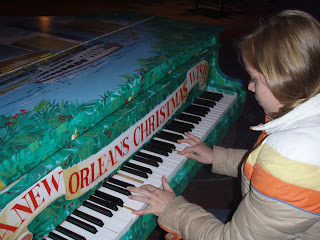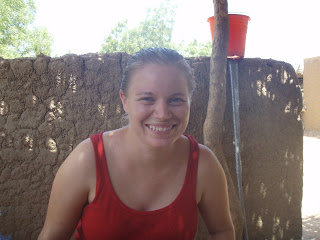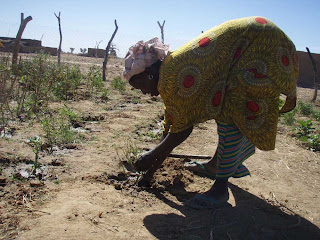
Sunday, February 14, 2010
Changes and Frustrations (We should be starting any day now...)

Tuesday, February 2, 2010
Noma: "The Face of Poverty"

Smile Train is an organization that provides free cleft surgery for children in developing countries. I shot them an email. Their quick reply brought news that not only do they work in Mali, but there was a team of Canadian doctors coming to Bamako the first 2 weeks of February to perform free surgeries! Within a few days we were on a bus to Bamako with mother and child, headed for the hospital.
Wednesday, January 27, 2010
BuildOn
Monday, January 25, 2010
Dream within a dream







In the meantime, life in Tongo goes on. The garden project is a total success. The women have planted tomatoes, onions, peppers, cabbage, papaya, okra, and whatever else suits their fancy. They show such pride in their accomplishments, and compete for the most luscious plot:


Monday, September 7, 2009
To honor and OBEY
DISCLAIMER: The Views Represented on this Website Are Expressed as a Private Citizen, and Do Not Necessarily Represent Those of the Peace Corps or the U.S. Government.
THIS IS BULLSHIT! Just when Mali starts to make progress on equal rights, the president pushes it way back. It's so disheartening!
The following information is taken from an article on BBC news:
The president of Mali has announced that he is not going to sign the country's new family law, instead returning it to parliament for review.
Muslim groups have been protesting against the law, which gives greater rights to women, ever since parliament adopted it at the start of the month.
President Amadou Toumani Toure said he was sending the law back for the sake of national unity.
Muslim leaders have called the law the work of the devil and against Islam.
More than 90% of Mali's population is Muslim.
Some of the provisions that have proved controversial give more rights to women.
For example, under the new law women are no longer required to obey their husbands, instead husbands and wives owe each other loyalty and protection.
Women get greater inheritance rights, and the minimum age for girls to marry in most circumstances is raised to 18.
One of the other key points Muslims have objected to is the fact that marriage is defined as a secular institution.
Mali's current law specifically states that a wife must obey her husband, and that is the way things should stay says Mahmud Dicko, president of Mali's High Islamic Council.
"We're not trying to make women slaves. Not at all," he says.
"It's just the way our society is organised. The head of the family is the man, and everyone in the family has to obey him.
"It's like that to create harmony."
Tens of thousands have turned out at protests in Bamako in recent weeks and there have been other demonstrations against the law across the country.
Thursday, July 30, 2009
Drought
I’ve often enjoyed awkward pauses in conversation, laughing inside at the clumsy silence hanging between two people. This evening, however, the pause lingering in the air presses against me like a growing balloon, and there’s no inner smile to break its taut skin.
“I ni su Yaya. K’u jooni? Pi-ar-denni?” I’ve crossed paths with my close friend Yaya in the faint blue afterglow of twilight, and his white smile glows at me in the darkness. We exchange greetings, which flow naturally between us, overlapping, advancing and retreating like waves. When the tide ebbs, I complain about the topic that no one can avoid,
“I was sure rain was going to come this afternoon. The wind kicked up, the sky darkened, and then it vanished.”
“I thought it was going to come too. I really did.”
“How many millimeters have you measured this month?”
“Not even twenty. Last year we had more than 200 by this time. I’ve never seen anything like this. No one has.”
His words drop into the night air and leave only a hole, a gaping silence that I don’t know how to fill. I look up at the emerging stars, that lovely sight that has become ominous in its unabashed verification of a clear and cloudless sky. It’s been twelve days since the last rain fell in M’Pedougou, and everything and everyone watches the sky in angst. The corn plants, poking their puerile heads out of the ground, complain amongst each other in soft parched murmurs about the drought and the noisome clouds of dust.
The silent balloon pressed against my flesh starts to hurt, but I don’t know what to say to Yaya. He rescues me with a gentle, “A be na nogoya,” It’ll get better. We’ll get out of this. I nod and affirm his blessings, and we continue on our paths. The silence, though broken, still clings to me and I can’t shake off its sticky tendrils.
What if it doesn’t nogoya? What if this is a symptom of global warming, and Mali (and the world) is in store for more and more extreme weather events that will disrupt our ways of life and of living? I look up at the sky again, trying to locate the shreds of guilty silence still weighing on me in the darkness. The sticky part of the silence is the part gnawing its way into my conscience: the awareness of my own contributions to that unseen but present layer of greenhouse gases. The stars wink down at me through these layers, and I remember with greater guilt that I’m going home soon. Back to the land of gas-guzzling cars, heaters, air conditioners and TVs and rampant, blind, blithely rapacious energy use that we use to entertain ourselves and to make our lives “comfortable” and “easy.”
Standing here in the dark on a well-worn footpath in this small African village, I have felt no greater shame. It will be Yaya, the man with the warmest smile I’ve ever known, who will have to sell some cows this year to help his family get by. It will be Alimatu, my host mom who tells stories late into the night, who will have to scrape at the dry earth with her short-handled hoe to re-plant crops when the first planting has died of thirst. It is these people, who have worked outside under a blistering sun their whole lives, who have never known the luxuries of light switches, running water, refrigerators, or cars in which to zip down to the 7-11 for a slurpee and a bag of chips, who will suffer (first) through the consequences ofour behavior.
The true irony lies in their desire to be like us. They are people who traditionally lived only off the interest of their “natural bank account,” leaving the principal alone so their kids would have something to live of off. Then they see and hear of America, which is eating away directly at its principal and proclaiming itself “wealthy,” and they are envious of our wealth. It’s normal, it’s only human, but it’s also tragic.
How can I go home and go back to the American life, after seeing and knowing what I do now? Now that I know that when I hop into a car or buy food shipped from across the country, doused with fertilizers, and processed in a fume-emitting factory… that in merely participating in the American lifestyle, I’m (in an indirect way, but as part of the larger problem) making the soil just a little bit dryer for my dear friends Yaya and Alimatu. They won’t blame me. When I leave they’ll thank me profusely with heaps of peanuts and chickens for coming to “help” them, and I’ll smile guiltily and glance up at their dry skies. That will be an awkward pause that sticks with me for awhile.
Wednesday, July 22, 2009
The Blog is Back!

Sorry it been so long since my last post! So many people have asked me to keep posting, so here it is!

Another fun occasion was going to my friend John's village for the dedication ceremony of his completed women's garden project. Malians really like to give long speeches on formal occasions, and this was no exception. After listening to words from the chief of the village and the mayor, John also gave a speech in Bambara to thunderous applause. We were treated as distinguished guests, adored by the kids, and given a gourmet meal of beans.


























